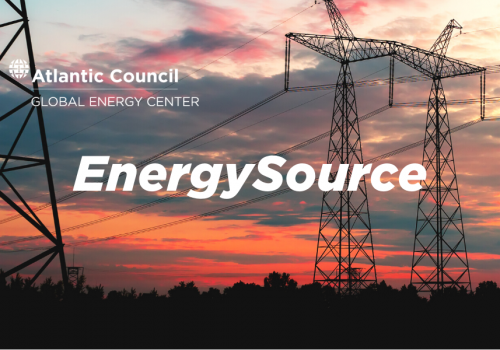Abrão Neto, the chief executive officer of AmCham Brazil (the American Chamber of Commerce in Brazil), signaled Brazil’s readiness to enhance collaboration with the United States on energy security by bringing the public and private sectors together to deliver concrete outcomes.
Speaking at an Atlantic Council Global Energy Center’s event on November 13 on the sidelines of COP29 in Baku, Azerbaijan, Neto and Landon Derentz, senior director and Morningstar Chair for Energy Security of the Global Energy Center, noted that Brazil and the United States are natural partners for strengthening cooperation given both countries’ historic leadership in innovation and research and development. Brazil’s robust biofuels sector and mature wind turbine manufacturing capacities demonstrate the country’s ability to drive energy sector transformation while meeting energy security needs.
STAY CONNECTED
Sign up for PowerPlay, the Atlantic Council’s bimonthly newsletter keeping you up to date on all facets of the energy transition.
Both Brazil and the United States also understand that innovation is a key aspect of energy security. Looking ahead, both countries are well positioned to partner on enduring issues such as securing the supply chains central to energy security needs and energy transition efforts.
Following Neto and Derentz’s conversation, Cassia Carvalho, the executive director of the Brazil-US Business Council, moderated a panel with Allyson Book, the chief sustainability officer of Baker Hughes, Leonardo Botelho, the head of international and investor relations at the Brazilian Development Bank (BNDES), Jake Oster, the director of sustainability policy at Amazon Web Services, Owen Herrnstadt, a member of the board of directors at the Export-Import Bank of the United States (EXIM), and Anna Shpitsberg, the chief climate officer at the US Development Finance Corporation (DFC).
Unlocking climate and energy finance
Hernstadt of EXIM and BNDES’ Botelho emphasized that their institutions and DFC will continue to play critical roles in de-risking projects and promoting competitive markets.
In Brazil specifically, where DFC just opened its first Latin America office this past March, Shpitsberg was optimistic about the level of opportunity she sees in the country. In October, DFC signed a cooperation framework arrangement with BNDES to enhance co-investment opportunities in a number of energy and climate sectors such as innovation, infrastructure, mining, biofuels, decarbonization, and green hydrogen.
Private sector investment in the energy transition
Industry has a key role in developing and deploying the technology necessary for accelerating the energy transition. One area of opportunity in particular is in methane abatement. Baker Hughes’ Book said that not enough is being done to address this potent greenhouse gas, but this creates an opportunity. Investors must look closely at the tools necessary to tackle methane emissions in Brazil and elsewhere in the coming year.
Amazon’s Oster noted that technology companies are also in a position to lead on investments in renewable energy and sustainable practices.
Looking ahead: strengthening collaboration
On public investments, Brazil and the US are both looking to strengthen partnerships. Shpitsberg and Botelho both expressed optimism for future collaboration between their organizations, noting that the opportunity to drive investments in Brazil is still large. Working together will be crucial to ensuring that future investments lead to energy sector innovation efficiently and effectively.
Similarly, Book and Oster said the private sector will also focus on building partnerships across industry to advance energy and climate goals. This means using a range of finance instruments and expanding cooperation on clean energy technologies, including geothermal, hydrogen, and carbon capture, utilization, and storage.
The discussion in Baku signals that industry, finance, and government are continuing to push forward investments in clean energy and build coalitions in the year ahead with an eye toward COP30 in Brazil.
Bailee Mathews is a program assistant with the Atlantic Council Global Energy Center.
MEET THE AUTHOR
RELATED CONTENT
OUR WORK

The Global Energy Center develops and promotes pragmatic and nonpartisan policy solutions designed to advance global energy security, enhance economic opportunity, and accelerate pathways to net-zero emissions.
Image: Wind turbines in Beberibe, Brazil. (Vitor Paladini, Unsplash). https://unsplash.com/photos/wind-turbines-on-green-grass-field-under-blue-sky-during-daytime-sQktcFEhHs8





